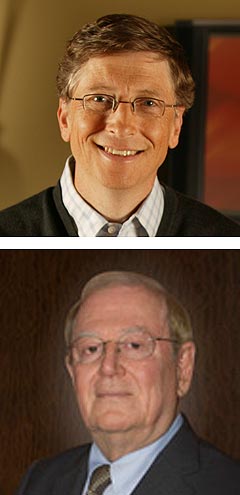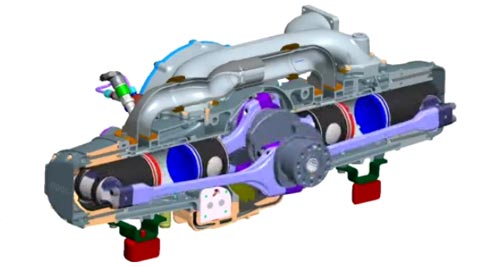News - General News - Technology - EcoMotors OPOC engineBillionaires back Opoc engineOpposites attract: EcoMotors's opposed-piston Opoc engine modules can be connected by an electronically controlled clutch. Gates tips money into engine that is said to cut fuel consumption by 50 per cent14 Jul 2010 AMERICAN billionaires Bill Gates and Vinod Khosla have tipped in $US23.5 million ($A26.7m) to help fund the development of an experimental internal combustion engine designed by a former Volkswagen powertrain engineer. The patented Opoc two-stroke engine – using opposed pistons in a modular boxer cylinder layout – is the brainchild of Peter Hofbauer, former head of powertrain development at Volkswagen AG and now chairman and chief technology officer of Detroit-based EcoMotors International. The engine, which the company claims is in its sixth generation of prototype, is said to have 50 per cent fewer moving parts and provide 50 per cent greater fuel efficiency. It can be configured to run on petrol, diesel or ethanol, and is said to be half the weight of a conventional engine of similar power. The funding by Microsoft founder Mr Gates and Sun Systems founder-turned-venture capitalist Mr Khosla will be sufficient to complete engineering and testing of the Opoc engine, according to EcoMotors CEO Don Runkle, himself a former vice-president of North American engineering for General Motors and executive of Delphi Corporation.  Left: Bill Gates. Below: Peter Hofbauer. Left: Bill Gates. Below: Peter Hofbauer.In a media release announcing the funding, Silicon Valley-based Mr Khosla – well known for investment in speculative environmental technologies – said the Opoc engine was precisely the kind of “game-changing innovation” that his Khosla Ventures company was passionate about. “The only truly disruptive technologies are those that can provide not only payback in months but also economic and carbon benefits to large segments of the world's population without the need for subsidies or massive infrastructure investments,” he said. “Among next-generation propulsion systems, the Opoc engine is broadly applicable and can provide lower carbon emissions than almost any other technology.” Mr Khosla’s Khosla Ventures owns 47 per cent of EcoMotors. Mr Gates, who now runs the Gates Foundation with wife Melinda, said he had invested in the project because of its promise to provide affordable, low-emission transportation for the developing world. “EcoMotors has developed a promising technology that could help reduce levels of greenhouse gas emissions in a low-cost, globally relevant way,” he was quoted as saying. Engine inventor Mr Hofbauer is credited with developing VW’s high-speed diesel engine that won 2009 Green Car of the Year award and became the foundation for the clean diesel engines in several VW vehicles. His latest engine is said to be suitable for any use anywhere that internal combustion engines are used now, in cars, light trucks, commercial vehicles, aerospace, marine, agriculture, auxiliary power units and generators. Opposed piston engines are not new. Raymond Koreyvo patented and built a two-stroke diesel using this layout in 1907, and variations have been made commercially for use in a wide variety of applications, from aircraft to locomotives and submarines. The double-ended Opoc design uses a central crankshaft like a conventional boxer engine for each module, but instead of cylinder heads at the outer end of the cylinders, it has an extra set of pistons connected externally to the crankshaft. On the compression stroke, these extra pistons move inwards towards the conventionally mounted pistons which are moving outwards. With the two pistons compressing the fuel-air mixture between them, a large quantity of the gas can be compressed without a long piston stroke, allowing faster piston speeds. Fuel-air mixture – under turbo pressure – enters through ports in the cylinder walls and exits the same way. One of the innovations of the Opoc engine is that twin-cylinder modules can be strung together via electronically controlled clutches according to the power requirement. The clutch enables one or more of the modules to be disconnected and shut down to save fuel under light loads, such as highway cruising. This system saves more fuel than conventional engine shut-down systems, such as GM’s Active Fuel Management, which has to carry the mechanical load of the inactivated pistons. EcoMotors says the engine will go into production in Michigan, where a factory was to be established to take advantage of the state’s resources. The State of Michigan has been offering generous breaks for eco-friendly automotive manufacturing operations, such as electric car battery plants. In May, EcoMotors received $18 million in funding from Chinese automotive component supplier Zhongding Holding Group. Mr Gates’ best friend, billionaire investor Warren Buffett, has also invested in eco motoring, buying into China’s biggest lithium-ion battery maker, BYD, which is gearing up to build electric vehicles.  |
Click to shareGeneral News articlesResearch General News Motor industry news |














Facebook Twitter Instagram